Bucha
Kyiv region, Ukraine
Rapid Assessment of Recovery Needs
Click here to go to the overall for the three towns.
Click here to go to the Irpin town report.
Click here to go to the Hostomel town report.
Bucha town is a part of the Kyiv oblast (region), centre for the Bucha amalgamated community (which consists of 14 settlements), and a rayon (district) centre for the similarly titled territorial-administrative area, which consists of 12 territorial amalgamated communities (including Irpin and Hostomel). (See Map from BBC).

Bucha town was held under temporary occupation of Russian forces for 33 days, being captured on February 27, and liberated on March 31, 2022. As stated by respondents, during the occupation period, some local authority staff stayed in the town, as did some workers of healthcare system and emergency service units, continuing to fulfil their duties (to the extent possible) even under the pressure of Russian troops.
During the temporary occupation period, Bucha town was a deployment base of the Russian troops, where no extended combat activities took place (unlike situations of Hostomel and Irpin).
Casualties were primarily among civilians, with severe damage to public and critical infrastructure. Up to 3,500 civilians remained in town during occupation. On May 12, Bucha town major reported that 456 civilians were murdered by occupiers in Bucha community (including 419 in Bucha town). These numbers continue to rise and many people are still registered as missing.
Evacuation of civilians and delivery of essential goods during those 33 days were ensured by Ukraine State Emergency Service in coordination with legitimate local authorities, with the support of volunteers (men and women), who were coordinators and drivers, several of whom were murdered by Russian occupiers while carrying out these activities.
As of early June this year, local authorities state that the population in Bucha town currently counts more than 10,000. Approximately 2,000 children are back to Bucha town, of whom 300 are preschool age. Chart #1 suggests comprehensive comparison of pre and post invasion state of affairs.
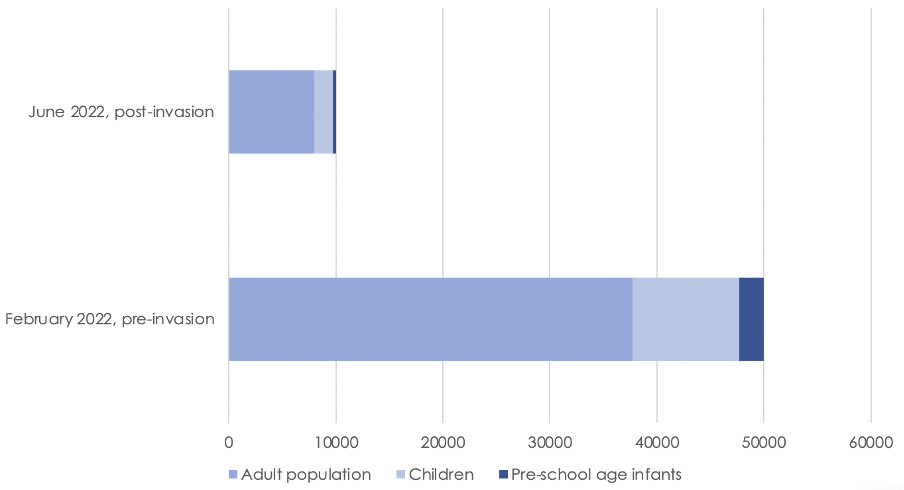
Chart #1: Bucha town population
As of June 13, the reported overall number of damaged buildings in Bucha community is 2,343, of which 2,143 were residential. In the pre-invasion period, 10,317 private homes and 391 apartment buildings were situated in the community. Currently, local authorities report that as a result of temporary occupation and missile strikes, 1,839 (18%) of private homes are damaged, of which 179 completely destroyed; and 304 (78%) of apartment buildings are damaged, of which 2 completely destroyed. Chart #2 and #3 suggest comprehensive comparison of pre and post invasion state of affairs.
Chart #2: Single-Family
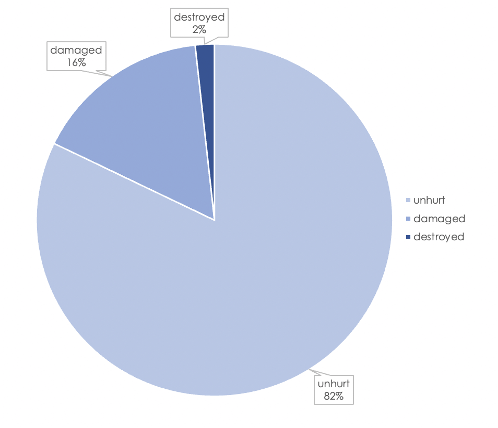
Total 10,317 Houses
Chart #3: Multi-Family Apartment Buildings
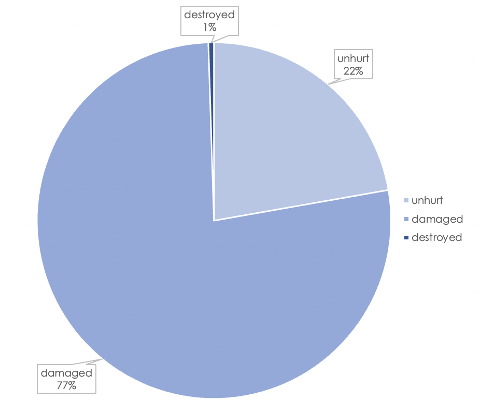
Total 391 Buildings
Local authorities report that overall 200 non-residential buildings in Bucha community were damaged by missiles strikes and shelling, of which:
- 27 educational establishments (out of 35 pre-invasion operating in Bucha community, including kindergartens and schools) of which one school completely destroyed, and 4 out of 7 kindergartens damaged,
- 18 units of cultural and public infrastructure (including libraries, houses of culture),
- 6 sports facilities,
- 21 units of healthcare infrastructure, resulting in one being completely destroyed,
- 8 administrative buildings,
- 120 other urban and commercial buildings.
- Electricity, water supply systems, heating and utility services were all damaged.
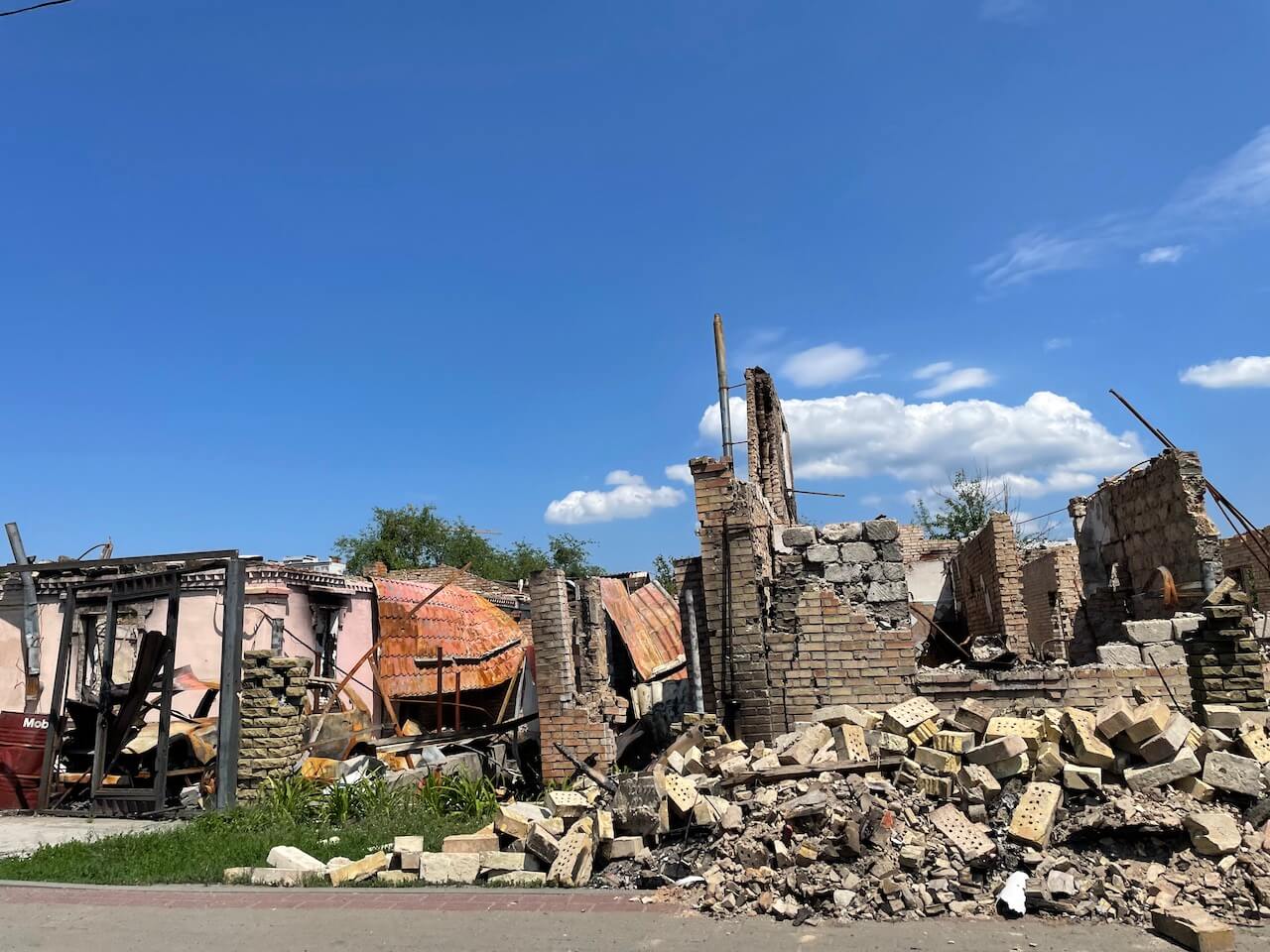
Photo #4: Bucha - Single Family House 3
Respondents attached special focus to support for the restoration of small and medium enterprises of the town and the area. Currently, central and local authorities, in cooperation with special services and companies, supported by civil society, business and volunteers, engaged locally and internationally, are bringing crucial aspects of infrastructure to life.
The following chapter is dedicated to a detailed analysis of current challenges and post-occupation needs of the Bucha community, based on the perspective of regional and local authorities and agencies, business representatives, civil society, and religious community inputs. Their contributions were obtained through nine comprehensive structured interviews in formal discussions (resulting in more than 5 hours of recorded interviews).
CORE CHALLENGES AND NEEDS IDENTIFIED
In terms of post-occupation recovery concerns, the following categories were mentioned as top priority ones (each respondent could identify multiple priorities). With nine respondents, each point stands for one respondent who prioritised that category of needs. More detailed response rate is shown in Chart #4. Most frequently mentioned high priorities are:
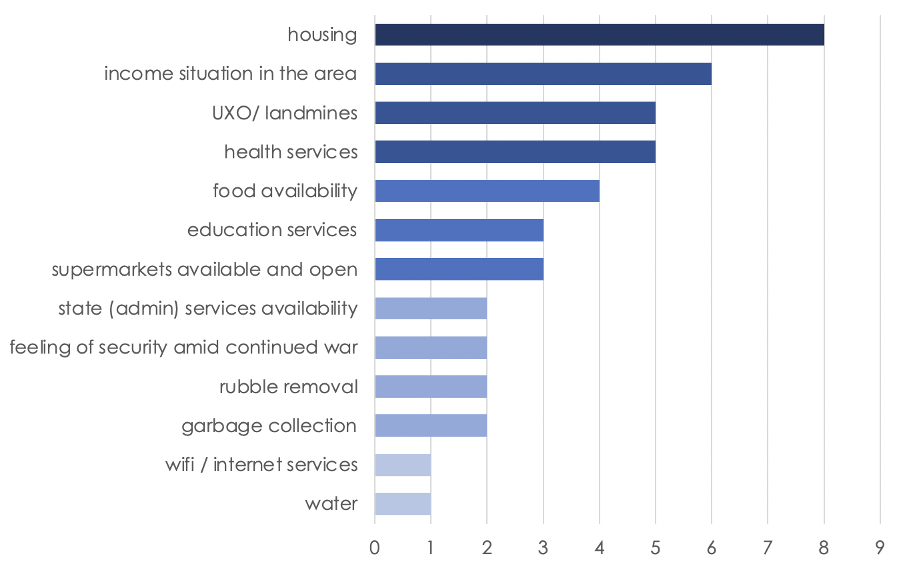
Chart #4: Priority Needs Identified - Bucha
Other categories not identified as priority needs by any respondent, implying that these issues are already largely resolved or not relevant: electricity, mobile phone services, public security (personal safety), access to information, legal aid (free primary aid).
With regard to each category of prioritised needs, respondents reported the following more detailed state of affairs:
HOUSING
Ukraine established a national program on real estate restoration. 2,873 applications regarding damaged real estate (including more than 1,430 private houses) were submitted by Bucha community members to this program as of mid June, 2022. Currently, out of this number, only 1,983 applications (including at least 772 private houses) have been reviewed / analysed. More applications continue to arrive. Local businesses submit their applications either to Bucha Council, or to the Chamber of Commerce, hence, not all actual applications for the restoration of business venues are reflected in the data set. In this period, the state is developing the procedure of coverage for the registered and analysed losses. Some number of modular-type houses have already been provided, but more than 720 families in the community still urgently need temporary housing, and this necessity is rising as people continue to return back to their home towns and villages.
According to respondents, amid these developments, further support should be aimed at:
- establishment of temporary housing for inhabitants in urgent need,
- minor restoration in terms of supply of tools, materials and funds for roofs / windows / doors / furniture purchase or repairment,
- restoration planning and technical documentation drafting, and
- capital restoration of existing buildings (private housing, public infrastructure buildings, objects of critical infrastructure, regional units of state emergency services).
For this category of needs, the following actors reportedly provide aid: Central (national) Government of Ukraine, Metropolitan Epiphanius of Kyiv and All Ukraine, Churches from the United States of America, Government of Poland, Warsaw Fund, Rotary International, Ukrainians in Portugal, Greece, Foundations from Germany, private business from various countries, Non-specified International Organisations, Local Authorities.
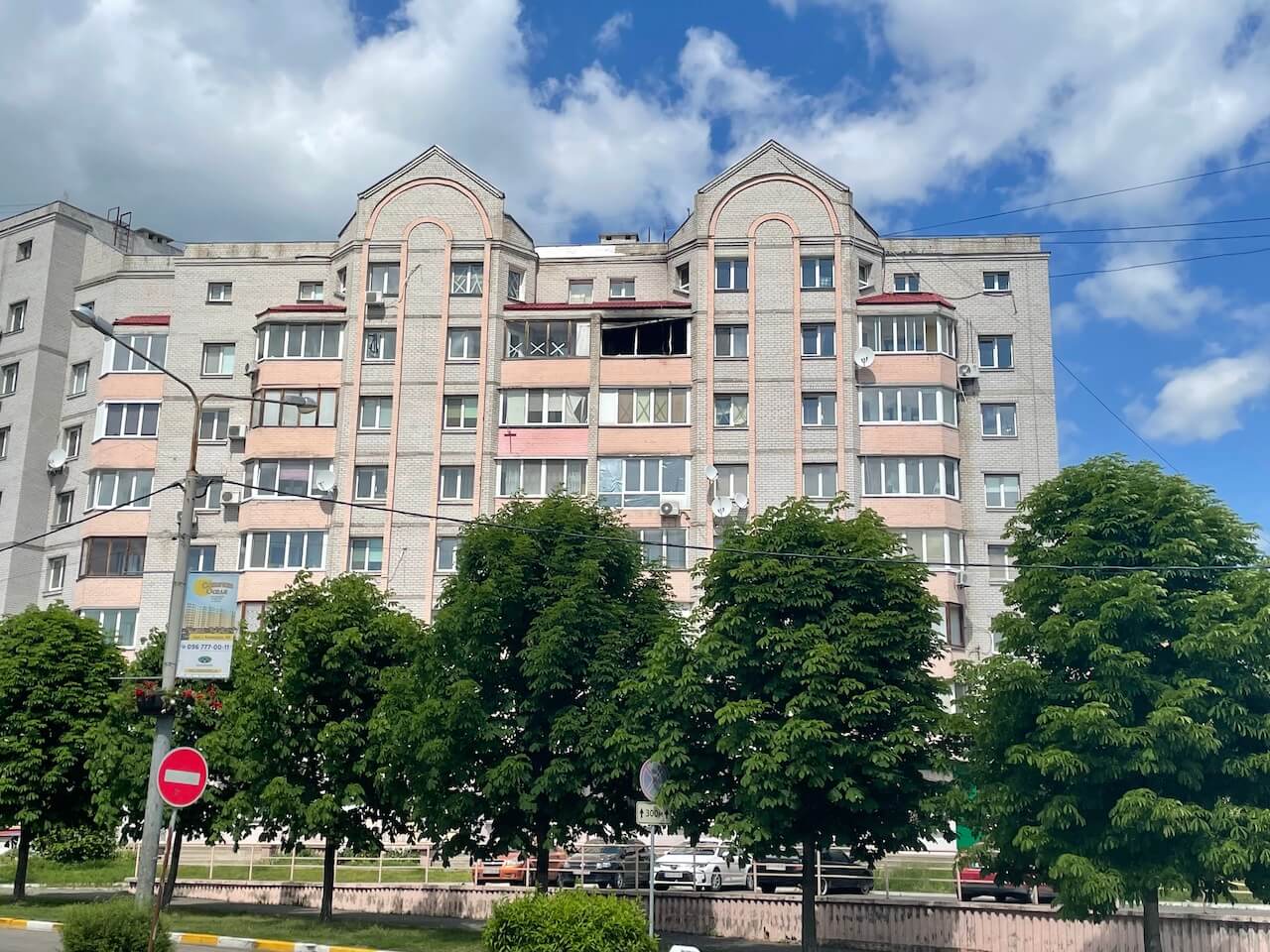

INCOME SITUATION
Based on respondents' input, all categories of business were hurt heavily by the Russian invasion of Ukraine. In Bucha rayon, there is a Restoration Commission, which, among other tasks, collects information about the needs of the local business community. As well, DIIA Business Bucha, and the Department of Economic Affairs of Local Council serve as contact points for businesses to share their inquiries. The predominant situation with jobs and income for the local population is still extremely difficult. For those who returned back home but lost all means of income generation, Bucha humanitarian headquarters provide some aid in a tailored manner, which helps people survive, but is not a sustainable solution in the long run.
According to respondents, amid these developments, further support should be aimed at:
- aid for local business recovery in terms of equipment, materials, and repair of manufacturing areas, micro-grants for business activation,
- creation of new jobs for those people who return to Bucha area (especially for those who lost their jobs at international companies based in the settlement, as these employers left Ukrainian markets).
Very limited aid was reported as available for this category of needs currently. At the same time, thematic foundations and support programs continue to emerge both in Ukraine and worldwide.
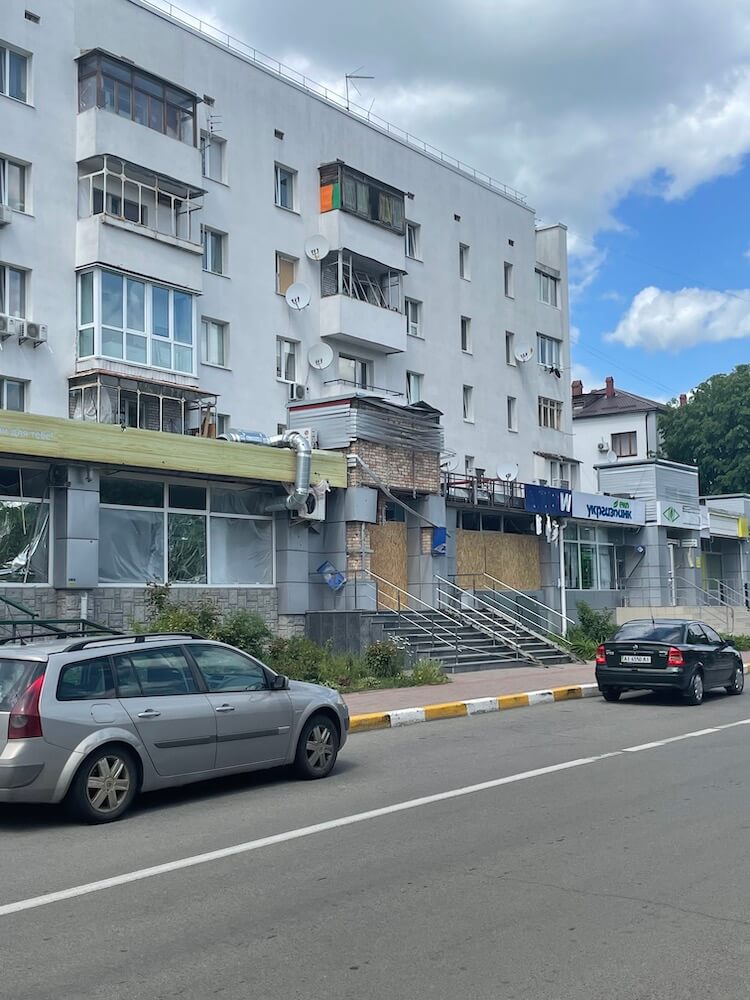
Photo #2: Bucha - Unidentified Small Business
UXO / LANDMINES (HUMANITARIAN DEMINING)
As reported by the State Emergency Service (Kyiv region headquarters), as of 7 June, 98% of public areas in temporarily occupied and now liberated inhabited settlements (i.e. municipal and critical infrastructure, common areas, highways and main roads have been cleared of explosive remnants); apartment buildings and private homes have been cleared upon owners’ requests. Safety of the local population was supported by the statement of local mayors calling on the local population to not come back before general demining actions were completed. Damaged housing is inspected for explosive risks upon owners’ request, as people return. Additionally, there is a need for further humanitarian demining actions for such areas as forests and forest belts, parks and agricultural areas. Full clearance of all areas is likely to require several years, once the war has ended.
According to respondents, amid these developments, further support should be aimed at:
- purchase of sapper equipment and personal protection items (ballistic helmets and wests) for servicemen and servicewomen of Emergency Services and Armed Forces,
- purchase of explosive-protected vehicles for demining missions and operations,
- educational materials, information sessions and lessons for local inhabitants concerning the rules of safe behaviour in areas with suspected explosive objects.
For this category of needs, the following actors reportedly provide aid: State Emergency Service (as main responsible agency at the national level), governments of Poland, Austria, United Kingdom, Ukrainian business, and Non-specified International Organisations, Local Authorities.
HEALTH SERVICES
For this category, respondents highlighted the need to restore buildings and other infrastructure of healthcare establishments. Additional support was also asked for capability revival (means of transportation, and equipment). Support for psychological health, trauma and emotional resilience were mentioned as particularly urgent needs.
For this category of needs, the following actors reportedly provide aid: Doctors Without Borders, Husak Clinics, Dobrobut Clinics, UNICEF, Friendly Parishes from the United States of America, Central and Local Authorities.
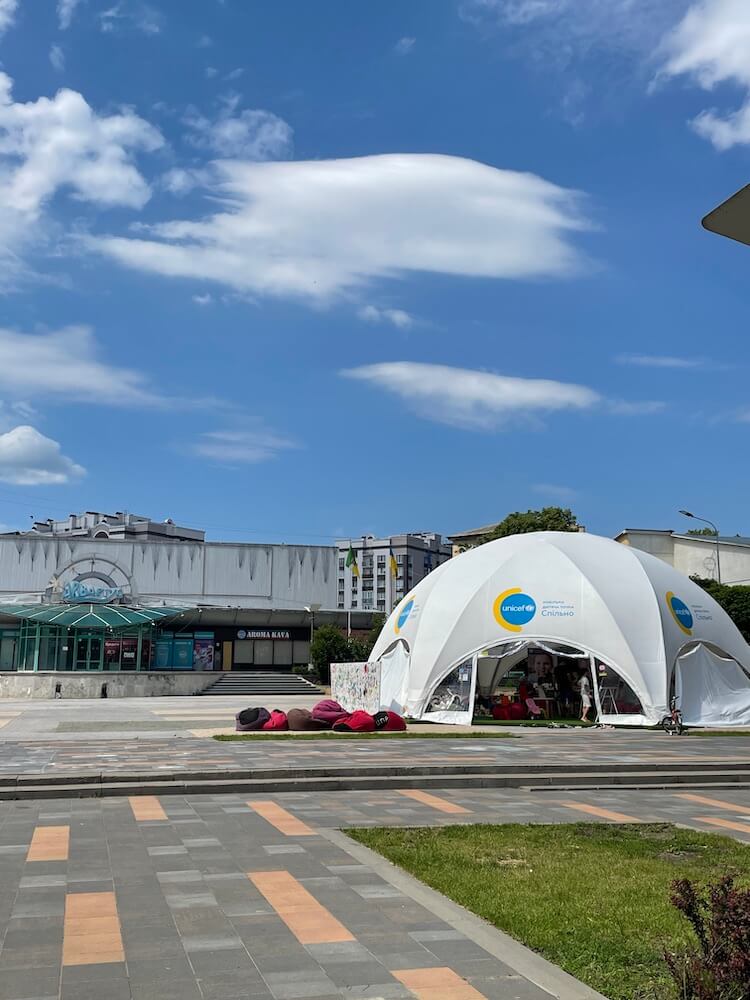
Photo #5: Bucha - UNICEF Point for Children
FOOD AVAILABILITY / SUPERMARKETS AVAILABLE AND OPEN
The issue of food security and availability has been largely resolved in Bucha town, with the reopening of most local food shops. Food assistance is still necessary for specific socially vulnerable groups and those servicemen and servicewomen who continue their missions on the ground, which are served by food packages and daily public kitchens. Regarding supermarket availability, these have partially reopened, although respondents reported a need for help with rubble removal and restoration of buildings where shops are situated.
For this category of needs, the following actors reportedly provide aid: Central (national) Government of Ukraine, Metropolitan Epiphanius of Kyiv and All Ukraine, Local Council Humanitarian Headquarters, Volunteers and Charitable Foundations, Private business and donors from Ukraine, Israel, Georgia, Latvia and other EU countries.
EDUCATION SERVICES
Respondents highlighted the need to restore buildings (schools, kindergartens, sport yards), purchase equipment (computers, as previously available ones were stolen by occupiers), and means of transportation (school buses). Local representatives informed about the aid provided by foundations from Czech Republic, Germany, and other countries.
STATE-PROVIDED ADMINISTRATIVE SERVICES
For this category of needs, a wide range of services were considered, including state registration procedures and social services. Hence, reported needs include building further capacity of social services, as the number of their staff is insufficient to the emerging quantity of people and families in Bucha community who are entitled to obtain social support under Ukrainian Law. Another aspect is the challenging procedure to obtain state-provided financial aid. Even though many services are available online, many people who applied for financial assistance months ago still do not know what they might do to either claim further implementation of such state service, or obtain information about their “place” in the queue of those who anticipate financial aid. This despite the fact that the Prime-Minister of Ukraine reported back in April that work to solve the issue is underway.
RUBBLE REMOVAL / GARBAGE COLLECTION
While major rubble are now being cleaned up by national and local agencies, the necessity still exists to support private companies and households in this regard. At the systemic level, specialised municipal vehicles were stated as necessary for further effective work (backhoe loaders, dump trucks, cranes for 15-25 tons, full-turn excavators). Properly equipped garbage trucks, septic trucks and other equipment were identified as core necessities in order to replace what was destroyed by the occupiers. Another aspect of rubble removal is to mitigate environmental impact on soil and water by cleaning toxic substances left by military equipment and weapons used.
For this category of needs, the following actors reportedly provide aid: State Emergency Service, Kyiv City and Region Entities, Neighbouring Communities, Local Authorities.
WIFI / INTERNET SERVICES
This aspect is restored throughout almost the entire territory of Bucha settlement, although not all businesses have obtained a sufficient level of connectivity to continue their work. Demand for a more secure and stable internet connection was expressed by respondents. National institutions in Ukraine, internet providers, mobile operators, SpaceX (by providing Starlink technology) granted major support for this category of needs.
WATER
Major aid to the state in restoring local water supply (along with drainage and sewerage) systems was provided by International Committee of the Red Cross and other international donors in the first days after the liberation of Bucha rayon. A joint project on water supply restoration engaged Irpin, Bucha, Hostomel and Borodyanka. Lasting 18 days, and as of April 28, water supply had been ensured to Irpin community, from where water pipeline restoration spread to other settlements.
According to respondents, amid these developments, further support should be aimed at:
- further evaluation and capital repair of water supply, drainage, sewerage, and heating systems of the settlements (as more people come back to their households and pressure on the systems rises, new issues may arise due to technical inability to identify such problems during earlier assessments),
- Funding of capital restoration of water treatment (aeration) systems in the region aiming at better environmental conditions and resiliency.
For this category of needs, the following actors reportedly provide aid: UNICEF, ICRC, ACTED, Volunteers and Business, Local Authorities.
CONCLUSIONS & KEY OBSERVATIONS
One of main challenges is the absence of free access to gasoline and petroleum on the entire territory of Ukraine, which consequently reduces speed of envisioned activities, logistics and repairs, and raises costs of any potential aid. Not all respondents mentioned this aspect as it was an issue of general knowledge in Ukraine, usually implied by default.
Even though the entire list of necessities is wide and multi-layered, two central ones constitute a vital construction for entire post-occupation recovery at this stage of development - housing and employment.
According to the key informants interviewed, at the very beginning of the deoccupation period international organisations (UN and INGO) provided assistance directly to local communities. Since then, nearly all assistance goes through national emergency response organisations, churches and the Humanitarian Hubs established by local councils, and from there to those in need of assistance.
Local networks and authorities have proven to be best situated and equipped to collect, operate and spread the word about the urgent needs of their communities. However, availability of knowledge and information about global opportunities, assistance programs and initiatives are often lost on the way to final recipients and beneficiaries, who are not always aware of the sources of the support they receive.
Rather than importing supplies to respond to local needs, in most cases it is possible (and desirable) to solve problems with locally available supplies. Majority of products, goods and services required for effective and efficient post-occupation recovery are available on Ukrainian markets in other regions and cities. Purchasing locally in Ukraine would also support the business environment and national economy.
While the war is still on, any type of post-occupation restoration is rather complicated to orchestrate and conduct. Nonetheless, local inhabitants express a strong desire to return to normal life as soon as possible, a readiness to restore their houses, and to return to any available jobs. Continuing assistance for the needs identified in this report will provide an important contribution to immediate and medium-term recovery. Respondents expressed their willingness to be contacted regarding potential support; contact information may be requested from RMTeam International ([email protected]).